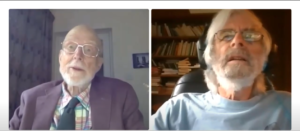Khari Douglas will be covering the Virtual HLF 2020 on the CCC blog all week. Stay tuned for more and watch the program via livestream here.
The Virtual Heidelberg Laureate Forum (HLF) 2020 kicked off today (September 21st) via livestream. As part of the day’s program, Sir C. Antony R. Hoare and Leslie Lamport, both winners of the ACM A.M. Turing Award, sat down for a conversation to discuss their careers and offer advice to the young researchers in the audience.

Sir C. Antony R. Hoare and Leslie Lamport talk over video as part of the Virtual HFL
Lamport began the session by asking Hoare how his early school days prepared him to be a computer scientist. Hoare revealed he was nicknamed “Prof” by his classmates because of his studiousness and cited Bertrand Russell, the English logician, philosopher, and writer as a major influence. Hoare found Russell’s book Marriage and Moral very compelling and later studied Russell’s Introduction to Mathematical Philosophy. Hoare also mentioned Mathematics for the Millions by Lancelot Hogben as an early influence that developed his interest in mathematics.
After getting his Bachelor’s degree from Merton College, Oxford Hoare spent two years in the United Kingdom’s Royal Navy where he learned Russian and became qualified as a Russian interpreter. This skill came in handy later when he translated a collection of articles titled The Theory of Mathematical Machines, edited by Yu. Ya. Bazilevskii for pocket money.
Hoare went on to get a certificate in statistics from Oxford compelled by the philosophical question of “what kind of knowledge [is] expressed by a statement of probabilities of future events.” Subsequently, he worked on a number of projects related to statistics and computer programming including the Quicksort algorithm (watch more on that here) before winning the Turing award for his fundamental contributions to the definition and design of programming languages in 1980.
After Hoare explained his background, he and Lamport switched roles and Lamport discussed how he became interested in computer science. Lamport said he started with an interest in math before becoming interested in physics — that is until he realized he “wasn’t smart enough to be a physicist” so instead he “just got a Ph.D. in math.” While in school he had part time jobs programming which led to a job designing operating systems and eventually doing research.
Lamport, who won the Turing Award in 2013 for fundamental contributions to the theory and practice of distributed and concurrent systems, began working on concurrency when he read an article in the Communications of the ACM about a mutual exclusion algorithm that he found too complicated. In response he submitted a paper with a two process solution, but a couple of weeks later he received a letter back from the editor pointing out a mistake in his algorithm. The desire to solve this problem drove him to create Lamport’s bakery algorithm “which is intended to improve the safety in the usage of shared resources among multiple threads by means of mutual exclusion.”
Asked how he came up with the algorithm, Lamport said that other people viewed mutual exclusion as a math or language problem, but he regarded it as a physics problem: “You had to build two physical devices that wouldn’t do something at the same physical time.” In a similar vein, Lamport said that one of the major things he took away from his math education was realizing that “the math wasn’t important, it’s what is expressed that was important” and consequently he believes that math “should be as simple as possible.” This mentality eventually led him to design a temporal logic known as TLA, which only uses three operators aside from ordinary math: prime, box, and “another operator there for philosophical reasons.” X prime refers to the value of X in the next state, while “box” of a formula F means that formula F is true from this time on. The TLA+ formal specification language emerged from this temporal logic.
Finally Lamport and Hoare offered some career advice to young graduates. Lamport’s advice was to “Write, and write some more. Your profession is really writing — you write papers, you just create different plots that novelists or biographers do. Make everything you write a masterpiece…and welcome criticism of what you’ve written….If the critic doesn’t understand that’s your problem — you should have made them understand. Don’t just write for others, you should also write just for yourself…You don’t understand something unless you can explain it clearly in writing” and “If you can’t express something in math then you probably don’t really understand it.”
Hoare’s advice to the young researchers was to “Enjoy! Have fun! These are the two imperatives for successful research. If you do not enjoy it you will never endure the long periods of concentration required to make significant advances.” With that said, go out and do something fun — like watching all of the videos from day 1 of the virtual HLF, including Hoare and Lamport’s conversation, on Youtube here.









